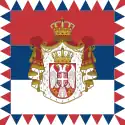Dragan Tomić | |
|---|---|
| Драган Томић | |
.JPG.webp) Tomić in the 1990s | |
| President of the National Assembly of Serbia | |
| In office 1 February 1994 – 22 January 2001 | |
| Preceded by | Zoran Aranđelović |
| Succeeded by | Dragan Maršićanin |
| President of Serbia | |
Acting | |
| In office 23 July 1997 – 29 December 1997 | |
| Prime Minister | Mirko Marjanović |
| Preceded by | Slobodan Milošević |
| Succeeded by | Milan Milutinović |
| Personal details | |
| Born | 9 December 1935 Priština, Yugoslavia |
| Died | 21 June 2022 (aged 86) |
| Political party | SKJ (until 1990) SPS (1990–2022) |
Dragan Tomić (Serbian Cyrillic: Драган Томић; 9 December 1935 – 21 June 2022)[1][2] was a Serbian politician who served as the president of the National Assembly of Serbia from 1994 to 2001.[3][4] He was a member of the Socialist Party of Serbia and was considered a loyal supporter of Slobodan Milošević. Tomić was director of RTV Politika, one of Serbia's main TV stations, and director of Jugopetrol AD, the state oil company.[5]
He was a member of the League of Communists of Yugoslavia.[6] After Milošević reached the end of his two allowed terms as President of Serbia and got himself elected as President of Serbia and Montenegro, Tomić by default became acting President of Serbia,[7] from 23 July to 29 December 1997. In the second cabinet of the Prime Minister Mirko Marjanović, Tomić was the Deputy Prime Minister of Serbia, from 1998 to 2000.
Tomić was closely tied to Milošević. A 2000 report by Germany's Federal Intelligence Service alleged that Milošević essentially ran a criminal operation, particularly after the 1992 sanctions on Yugoslavia caused "massive smuggling operations...controlled by Milošević and his cronies, who made vast profits from it"; Tomić was named as one of those cronies.[8] Under Milošević's regime, Tomić led Jugopetrol when "fuel-smuggling was a multi-million dollar business",[9] and "reportedly profited handsomely from the illicit oil that flowed into Serbia during sanctions".[10] Serbian mobster and paramilitary leader Arkan gave Tomić a medal because he had provided gasoline for Arkan's Serb Volunteer Guard, a paramilitary unit guilty of war crimes and ethnic cleansing.[11]
References
- ↑ Dragan Tomić, the President of the National Assembly of the Republic of Serbia
- ↑ "Umro Dragan Tomić". Danas (in Serbian). 21 June 2022. Retrieved 21 June 2023.
- ↑ "National Assembly of the Republic of Serbia | Multi-party National Assembly of the Republic of Serbia (1991-2020)". www.parlament.rs.
- ↑ Lazić, Mladen (1999). Protest in Belgrade: winter of discontent. Central European University Press. p. 214. ISBN 978-963-9116-45-0. Retrieved 29 March 2011.
- ↑ Thompson, Mark (1999). Forging War: The Media in Serbia, Croatia, Bosnia and Hercegovina. Indiana University Press. p. 100. ISBN 9781860205521.
- ↑ Majdin, Zoran (28 August 2013). "Velika fabrika na jugu države". Vreme (in Serbian). Retrieved 21 June 2023.
- ↑ "Turning-point? Serbia". The Economist. 13 December 1997. pp. 45+. Retrieved 21 June 2022.
He has already put Dragan Tomic, a loyal apparatchik, back as president of Serbia's parliament, which makes him acting president
- ↑ Bideleux, Robert; Jeffries, Ian (2007). The Balkans: A Post-Communist History. Routledge. p. 277. ISBN 9781134583287.
- ↑ Baturo, Alexander (2014). Democracy, Dictatorship, and Term Limits. University of Michigan Press. p. 128. ISBN 9780472119318.
- ↑ Sell, Louis (2003). Slobodan Milosevic and the Destruction of Yugoslavia. Duke University Press. p. 190. ISBN 9780822332237.
- ↑ Cigar, Norman L.; Williams, Paul (2002). Indictment at the Hague: The Milosevic Regime and Crimes of the Balkan Wars. New York University Press. pp. 102–103. ISBN 9780814716267.

